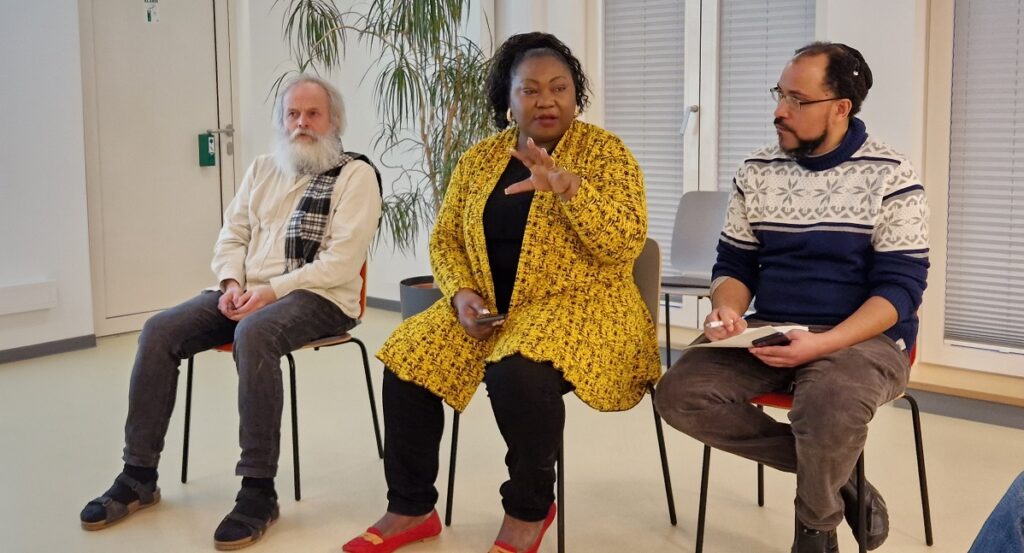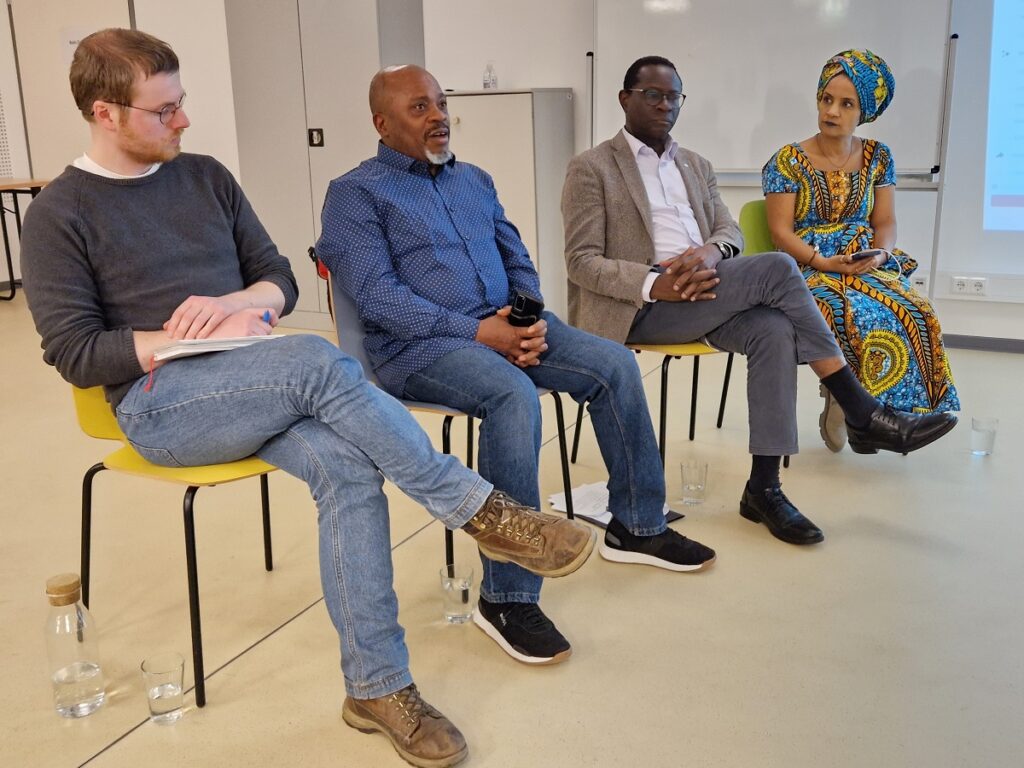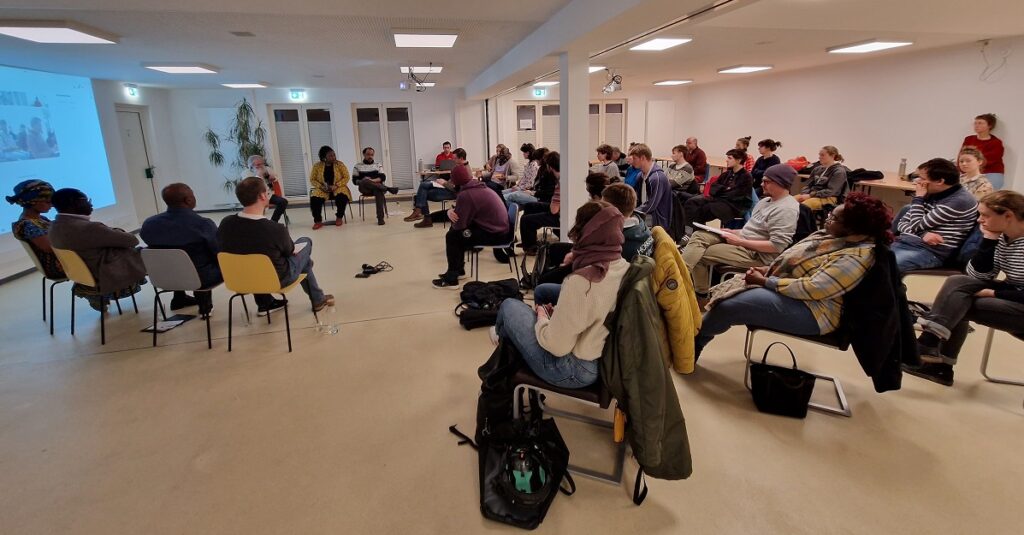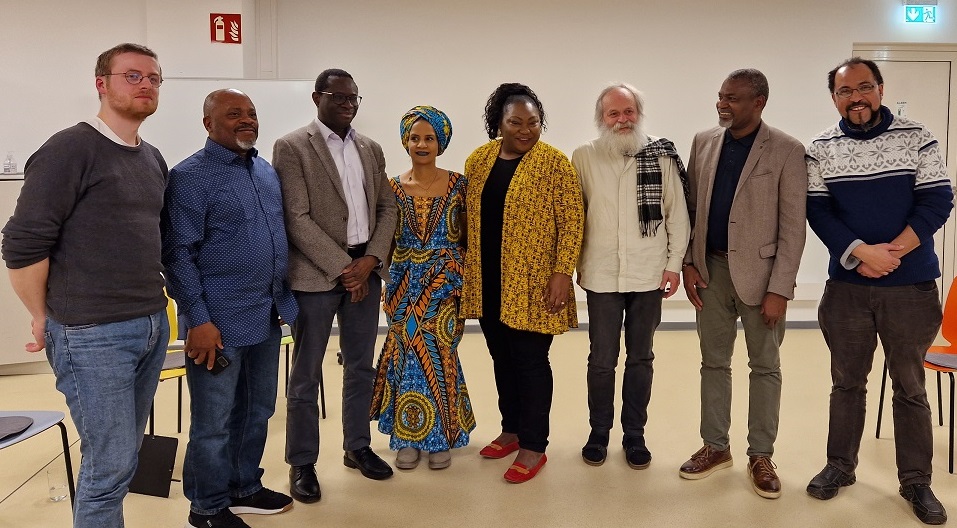A podium discussion on the situation of third-country nationals who fled the war in Ukraine took place recently in the East German city of Halle. There are currently about 38,000 refugees from Ukraine without Ukrainian citizenship in Germany.
The objectives of the event, organised by AWO Akademie Mitteldeutschland, were to reflect on the racist experiences of the African refugees, spotlight their current situation and make this better known in society and suggest ways of addressing the challenges they face.

Dr Sylvie Nantcha (middle), flanked by Pastor Peter Kube (left) and Phillip Egbunne of AWO Akademie Mitteldeutschland, speaking at the event/Photo: Femi Awoniyi
Among the panellists were Dr Karamba Diaby, member of the German federal parliament (Bundestag), Dr Sylvie Nantcha, chairperson of the African Network of Germany (TANG), and Kazeem Ojoye, chairman of the Nigerian Community in Bayern. Others were Amal Abbass, Executive Director of Tubman Network Germany, Pastor Peter Kube, chairman of the Council of Religion Halle Saale and yours truly (Femi Awoniyi, President of the Nigerians in Diaspora organisation Germany and Publisher of The African Courier).
Racism at the borders
The discussion, entitled “Racism in the context of the Russia-Ukraine war”, dwelt mainly on the situation of the Africans, mostly students, who were living in the country when the Russians invaded Ukraine on 25 February 2022.
A film was shown on the plight of Africans and Asians who encountered discrimination at the borders while fleeing the war to safety in neighbouring countries.
The images of Africans crying for help at the borders drew the attention of the world to their precarious situation and mobilised the Black community in Europe to support them.
Migrant organisations to the rescue
Ms Nantha of TANG talked about how the videos affected her. She said the images did not only shock her but also challenged her to act.
Nantcha mobilised Black organisations in Germany to embark on a joint rescue mission.
In collaboration with the Hamburg-based jurist Irene Appiah and Asmaras World, a refugee support group in Hamburg, TANG raised 50,000 euros with which they hired buses that evacuated more than 1,000 Africans from the borders to Germany.

From right: Amal Abbass, Dr Karamba Diaby, Kazeem Ojoye and the moderator/Photo: Femi Awoniyi
Among the activities embarked upon by TANG and other organisations to help the refugees on arrival in Germany were the setting up of a phone hotline, interceding on their behalf with the authorities and supporting them to get accommodation and access housing and language courses.
Ms Abbass, who is the winner of this year’s Berlin Women’s Prize, focused on the current situation of the refugees, a year after the outbreak of war.
African refugees were no longer being allowed into the territory of the EU from Ukraine, she said. Moreover, those in Germany were also facing increasing uncertainties as many have been issued papers to leave the country. In fact, some have been deported to their home countries.
In his intervention, Mr Diaby, the Bundestag member representing Halle Saale, said Black activists reached out to him at the outset of the war drawing his attention to the precarious situation of third-country nationals (TCNs) among the refugees from Ukraine.
While the Ukrainian nationals are issued a 2-year visa and granted immediate access to welfare services and the job market, the TCNs were mostly given only short-term visas. In fact, the TCNs, under which the Africans fall, were treated differently depending on the federal state.
The Federal MP said he raised the issue of the TCNs in the Bundestag to draw the attention of his fellow lawmakers to their peculiar situation.

A cross-section of the audience at the event/Photo: Femi Awoniyi
Among other actions taken by the parliamentarian of Senegalese origin were contacting the federal interior ministry officials, impressing it upon them to reach out to their counterparts in Poland on the need to treat all refugees fleeing Ukraine the same way irrespective of their nationality and with dignity.
Kazeem Ojoye of the Nigerian community in Bavaria said the refugees were thrown into a situation that they were ill-prepared for. He reported that most of those in Munich were Nigerians, many of whom were medical doctors or medical students.
Racism during their journey to the country and on arrival made the situation more difficult, he said. This inhuman treatment took a mental toll on the refugees.
Amal Abbass also touched on racism, describing how many of the students were taken off the train from Poland by the police and subjected to inhuman searches, including requiring them to undress. Many were also misled by the police into applying for asylum, Abbass said.
Karamba Diaby enjoined migrant organisations and activists to report stories of mistreatment of Black people to elected officials and other relevant institutions in their localities. Such mistreatment should not be tolerated because Germany “is a country under the rule of law”, he said.
This writer (Femi Awoniyi) narrated how the Nigerians in Diaspora Organisation Germany e.V. reacted to the situation by convening a community meeting at which the Help for Africans from Ukraine (HAUG) initiative was formed.
HAUG has been active in the support of the Africans by providing them information on their legal situation, where to obtain public support and how find admission into German institutions, among others.
Still facing daunting hurdles
One year after, the situation of the TCNs is still precarious with many of them threatened by deportation. And there is still no uniform nationwide regulation on how to handle their situation, with the federal states applying different rules.
Abbass said many have been deported already and those affected are barred from entering Germany for a year. She also revealed that 90 per cent of appeals against letters asking them to leave the country were rejected.

From right: Phillip Egbune, Femi Awoniyi, Pastor Peter Kube, Dr Sylvie Nantcha, Amal Abbass, Dr Karamba Diaby, Kazeem Ojoye and the moderator of the panel discussion/Photo: Femi Awoniyi
Most of the African refugees are students who would like to continue their studies in Germany but they face daunting hurdles, of getting admission into higher institution, finding a language course and decent housing, accessing healthcare and dealing with racism in everyday life.
Those who are lucky to find admissions into German tertiary institutions, there is the requirement that prospective foreign students can only be issued a student visa if they have a sponsor or provide a blocked account, containing 11,300 euros. This is very difficult for most of the students to fulfil.
Way forward
Karamba Diaby pointed to support schemes for students from Ukraine, such as the DAAD Stipendiaprogram, and Integra, which is for refugees who are not entitled to protection under §24 of the Foreigners’ Act.
This writer pointed out that the EU Temporary Protection Directive (EU-Directive 2001/55/EG), which provides the framework for the protection of people fleeing the war in Ukraine in member countries, only stipulates that TCNs be provided temporary stay until they are able to return to their home countries.
This, I said, is responsible for the gap in the legislation in Germany and for the plights of the TCNs.
I also suggested that the Skilled Workers Immigration Act (Fachkräfteeinwanderungsgesetz) could be used to provide opportunities for residency for the TCNs. The law promotes the immigration of qualified skilled workers from third countries to Germany by providing many opportunities for entry and stay of TCNs in the country.
MP Diaby noted the suggestions and said he would raise the situation of TCNs in the federal parliament so that the lawmakers could look at how a solution could be found.
In a nutshell, the panellists discussed the current situation and identified the gaps in government response and expressed the urgent need for action. It’s agreed that long-term and uniform solutions under the residence law must be found for the TCNs as a matter of urgency. In addition, access to language and integration courses, opportunities to study, receive training and work should be made possible for them.
Racism was blamed for the lack of media coverage of the situation of the TCNs and the work of the migrant organisations in supporting them. Panellists call for a greater engagement of the media in their work.
It was also noted that diaspora organisations, which are best situated to support TCNs, don’t get well funded. Increased advocacy was also identified as a way of changing the situation for the better.
Takeaways from Halle
It was a revealing discussion as the interplay mechanisms of advocacy and policy making and the different factors that affect government response to emergency situations were brought vividly to the fore.
The takeaways from Halle are that migrant organisations must engage elected officials and the mainstream media more actively. Only in doing so would they be able to decisively influence public policy.
And the African refugees from Ukraine in Germany still face uncertain future and the groups supporting them should renew their efforts.
The organisers of the event, which took place on 21 March, deserve kudos as it largely achieved its aim of illuminating a basic problem and hopefully will raise public awareness of it.
Femi Awoniyi
Background Info
Refugees from Ukraine who are Ukrainian citizens or third-country nationals who have long-term residency status or are married to Ukrainian nationals are granted a residence title for 2 years under §24 of the Residence Act, with direct and immediate access to the job market and all regular social services.
Although third-country nationals have fled the same war as Ukrainian nationals and are seeking protection, their current situation is one of insecurity, discrimination and arbitrariness.
Initially, TCNs were allowed to stay in Germany until May 2022 according to an ordinance issued by the federal government and until August 2022 after an extension of the ordinance.
Since September 2022, they have been confronted with different regulations of the 16 federal states. Many have received papers to leave the country while some have been deported.
Most TCNs would like to continue their studies in Germany and are looking to the government to grant them the opportunities to remain in the country.
 THE AFRICAN COURIER. Reporting Africa and its Diaspora! The African Courier is an international magazine published in Germany to report on Africa and the Diaspora African experience. The first issue of the bimonthly magazine appeared on the newsstands on 15 February 1998. The African Courier is a communication forum for European-African political, economic and cultural exchanges, and a voice for Africa in Europe.
THE AFRICAN COURIER. Reporting Africa and its Diaspora! The African Courier is an international magazine published in Germany to report on Africa and the Diaspora African experience. The first issue of the bimonthly magazine appeared on the newsstands on 15 February 1998. The African Courier is a communication forum for European-African political, economic and cultural exchanges, and a voice for Africa in Europe.


































